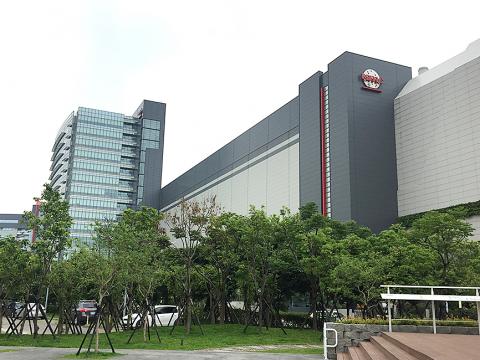Taiwan Semiconductor Manufacturing Co (TSMC, 台積電), the world’s largest contract chipmaker, plans to invest NT$400 billion (US$13.5 billion) to expand its Hsinchu production facility as it seeks to regain momentum amid a slowdown in the global smartphone market.
The plans are still in the preliminary stages, as the company still needs the government to help secure land and work on environmental assessments, TSMC spokeswoman Elizabeth Sun (孫又文) said by telephone.
Hsinchu serves as TSMC’s headquarters, a major production facility and includes its research and development center, where it builds the latest chip technology.

Photo: Hung Yu-fang, Taipei Times
While TSMC is expanding into new markets, such as components for cryptocurrency mining, it is confronting a slowdown in demand from smartphone vendors, including Apple Inc, as developed markets become saturated and replacement cycles lengthen.
The company last week forecast revenue for this quarter well short of analyst estimates, setting off a tumble in technology stocks around the world.
The potential investment is not included in the firm’s publicly disclosed plan for as much as US$12 billion of capital expenditure this year, but is incorporated in future projections, Sun said.
She declined to comment on the timeline for the project.
TSMC chief financial officer Lora Ho (何麗梅) has said capital expenditure for the next few years would be between US$10 billion to US$12 billion.
The company is the exclusive core processor provider for Apple’s latest iPhones. It also makes chips for other major tech companies, including Broadcom Inc, Nvidia Corp, Qualcomm Inc and Huawei Technologies Co (華為).
TSMC shares rose 0.68 percent to close at NT$223.5 in Taipei trading yesterday, paring this year’s decline to 2.61 percent.

LONG FLIGHT: The jets would be flown by US pilots, with Taiwanese copilots in the two-seat F-16D variant to help familiarize them with the aircraft, the source said The US is expected to fly 10 Lockheed Martin F-16C/D Block 70/72 jets to Taiwan over the coming months to fulfill a long-awaited order of 66 aircraft, a defense official said yesterday. Word that the first batch of the jets would be delivered soon was welcome news to Taiwan, which has become concerned about delays in the delivery of US arms amid rising military tensions with China. Speaking on condition of anonymity, the official said the initial tranche of the nation’s F-16s are rolling off assembly lines in the US and would be flown under their own power to Taiwan by way

‘OF COURSE A COUNTRY’: The president outlined that Taiwan has all the necessary features of a nation, including citizens, land, government and sovereignty President William Lai (賴清德) discussed the meaning of “nation” during a speech in New Taipei City last night, emphasizing that Taiwan is a country as he condemned China’s misinterpretation of UN Resolution 2758. The speech was the first in a series of 10 that Lai is scheduled to give across Taiwan. It is the responsibility of Taiwanese citizens to stand united to defend their national sovereignty, democracy, liberty, way of life and the future of the next generation, Lai said. This is the most important legacy the people of this era could pass on to future generations, he said. Lai went on to discuss

MISSION: The Indo-Pacific region is ‘the priority theater,’ where the task of deterrence extends across the entire region, including Taiwan, the US Pacific Fleet commander said The US Navy’s “mission of deterrence” in the Indo-Pacific theater applies to Taiwan, Pacific Fleet Commander Admiral Stephen Koehler told the South China Sea Conference on Tuesday. The conference, organized by the Center for Strategic and International Studies (CSIS), is an international platform for senior officials and experts from countries with security interests in the region. “The Pacific Fleet’s mission is to deter aggression across the Western Pacific, together with our allies and partners, and to prevail in combat if necessary, Koehler said in the event’s keynote speech. “That mission of deterrence applies regionwide — including the South China Sea and Taiwan,” he

UNPRECEDENTED: In addition to the approved recall motions, cases such as Ma Wen-chun’s in Nantou are still under review, while others lack enough signatures The Central Election Commission (CEC) announced yesterday that a recall vote would take place on July 26, after it approved the first batch of recall motions targeting 24 Chinese Nationalist Party (KMT) lawmakers and Hsinchu Mayor Ann Kao (高虹安). Taiwan is in the midst of an unprecedented wave of mass recall campaigns, following a civil society push that echoed a call made by Democratic Progressive Party (DPP) caucus whip Ker Chien-ming (柯建銘) in January to initiate signature drives aimed at unseating KMT legislators. Under the Civil Servants Election and Recall Act (公職人員選舉罷免法), Taiwanese can initiate a recall of district-elected lawmakers by collecting